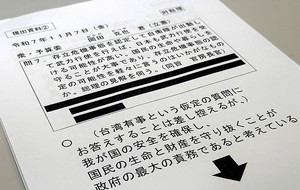Vox Populi, Vox Dei is a daily column that runs on Page 1 of The Asahi Shimbun.
January 5, 2024 at 12:04 JST
 A buckled road caused by the Jan. 1 earthquake in Noto, Ishikawa Prefecture (Yoshinori Doi)
A buckled road caused by the Jan. 1 earthquake in Noto, Ishikawa Prefecture (Yoshinori Doi)
It has been three days since a killer quake struck the Noto Peninsula in Ishikawa Prefecture.
But some survivors are still waiting in vain for relief supplies to arrive. They are enduring the bitter cold and powerful aftershocks.
At evacuation centers, "TKB+W" is the acronym for "toilet, kitchen (meals), bed and warmth," but even these basic needs have yet to be met.
And not only supplies, but information is also sorely lacking.
According to the telecommunications ministry, Japan Broadcasting Corp. (NHK) and four commercial broadcasters have suspended services in some areas of the city of Wajima.
They are reportedly unable to supply fuel to their relay stations and their emergency batteries are also out of power.
When a major disaster occurs, the volume of incoming information decreases suddenly because transmission becomes unstable and disrupts internet connections.
And as it gets harder to communicate by mobile devices, exchanges with families and friends invariably peter out.
Thus cut off from the outside world, so to speak, people feel as if they have been left behind.
Social psychologist Naoya Sakiya notes in his book "Fuhyo Higai" (literally, "damage caused by rumors"): "Lack of information doesn't help mitigate people's anxiety, which is the sole reason why rumors spread."
In the immediate aftermath of the Noto Peninsula earthquake, false information could be detected on social media, such as of the kind reporting that a family was trapped in the rubble of a collapsed home.
In the past, disaster-related groundless rumors were often motivated by racism, prejudice or a desire to be scandalous just for the fun of it.
But this time, generating a profit appears to have been one of the motives. X (formerly Twitter) now provides payouts to posters who meet certain conditions, including the number of views.
I am more saddened than angered that there are individuals who not only exploit people's goodwill, but also cavalierly take advantage of that to make money.
To stop that, it would help to disseminate correct information and allay people's anxiety. And that is one of the missions of the media.
--The Asahi Shimbun, Jan. 5
* * *
Vox Populi, Vox Dei is a popular daily column that takes up a wide range of topics, including culture, arts and social trends and developments. Written by veteran Asahi Shimbun writers, the column provides useful perspectives on and insights into contemporary Japan and its culture.




















A peek through the music industry’s curtain at the producers who harnessed social media to help their idols go global.
A series based on diplomatic documents declassified by Japan’s Foreign Ministry
Here is a collection of first-hand accounts by “hibakusha” atomic bomb survivors.
Cooking experts, chefs and others involved in the field of food introduce their special recipes intertwined with their paths in life.
A series about Japanese-Americans and their memories of World War II